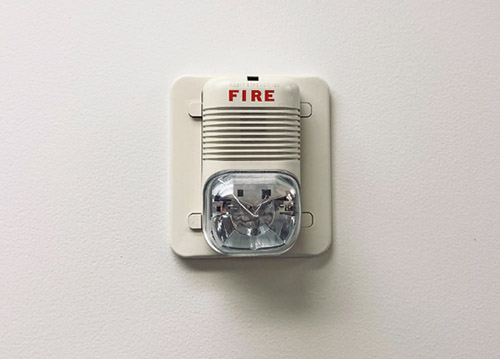
The fire alarm was blaring, the emergency lights were flashing, and not a single person moved from their seat. Not a single person appeared concerned.
A Jewish community event I attended recently filled the auditorium to capacity with hundreds of people. Children played with their friends while their parents sat together with other adults in the arranged seating. The alarm did not cause concern. No parents went to corral their offspring; nobody headed for the exits. Nobody looked in any way disturbed. And that bothered me.
Twenty-two years ago this month, three freshman students died in a fatal dormitory fire at Seton Hall University. Approximately 60 were injured, despite the prevalence of alarms throughout the building. Why? The alarms sounded so often for false alarms that nobody paid the “real alarm” any heed. When the alarm sounded on that cold January night, nobody wanted to leave their warm dorm room to go out in the frigid January cold. As a result, three families lost loved ones and countless others suffered.
Statistically, the majority of fire alarm activations are not for actual fires. According to East Franklin (New Jersey) Fire Captain Micah White: “Well over 95% of firefighting calls are for ‘smells and bells.’ Detectors are set off, but no actual fire. People smell something and call the fire department or an alarm sounds for some reason. It is for the small percentage of actual fires that we need to remain diligent 100% of the time.”
It was extremely fortunate that the event I witnessed did not involve an actual fire. But what if it had been a true emergency?
Quick Google searches on the topic yield many examples of large numbers of people who died in fires because they waited too long to exit the building and/or the number of people exceeded the available exits.
I continue to be concerned that nobody at the community event paid the slightest heed to the alarms. What if there had been a need to evacuate?
It would have been helpful if someone had made an announcement that the source of the fire alarm activation had been identified and there was no need to leave the building.
FirefighterInsider.com states: “Fire alarms are loud for a reason. They are designed to alert and awaken anyone who may be threatened in a fire, but they only work if they are treated as though it is an emergency.” All alarms should be taken seriously and knowing what to do in the event of an emergency is critical.
Yeshana (Cynthia) Lewitter, a firefighter in Metuchen and Edison, said, “In the same way flight attendants urge airline passengers to note the nearest exits to their seats, people should be aware of their surroundings in buildings and identify primary and secondary escape routes.”
She added: “If an alarm sounds, exit the building immediately and call 911. Do not assume that it is a false alarm or wait to see what others are doing. If possible, close doors behind you as you leave rooms/buildings to lessen the oxygen available that fuels a fire. Exit the building and move away to allow access for responding firefighters. Do not go back inside for any reason until given the ‘all clear’ by officials.”
Highland Park Fire Chief Mordechai Gershen said that “you have to take action” when there is an activated fire alarm, adding that buildings and property can be replaced, while lives cannot. “While 99% of activated alarms are not the result of fires, it is a case of pikuach nefesh to leave the building and call the fire department—even on Shabbat!”
Gershen added that there are many people who are very concerned about the laws of kashrut and would stop a fellow frum Jew from eating treif, but would ignore a sounding fire alarm. “Eating treif won’t kill someone, but fires certainly do.”
He recommended that each residence have working smoke and carbon monoxide detectors and know what their activation sounds like.
“People tend to exit a building from the same door they entered, while there could be other exits that are less crowded and closer to where they are, ” Gershen said. He cited a Rhode Island nightclub fire that killed 100 people and injured more than 200. There were at least six exits to the room, but they nearly all headed for the main exit, which became jammed with people.
Gershen offered one final thought: “What are we teaching our children when we choose to ignore the alarms? They learn in school about fire drills, and we are teaching them by example to do the opposite. Alarms are loud for a reason—it is to get our attention. We should listen to them.”
By Deborah Melman













